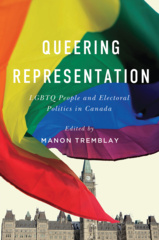
The Motivation to Vote
Explaining Electoral Participation
Elections are at the heart of our democracy. Understanding citizens’ decisions to vote or to abstain in elections is crucial, especially when turnout in so many established democracies is declining.
In The Motivation to Vote, André Blais and Jean-François Daoust provide an original and elegant model for why people vote. They argue that the decision to vote or abstain hinges on answers to four key questions: Do I like politics? Do I have a duty to vote? Do I care about the outcome? Is it easy to vote? These considerations make sense of people’s turnout decision most of the time, in a wide variety of contexts, and are strongly supported by empirical evidence from elections in five countries (Canada, Germany, Switzerland, Spain, and France).
The authors also test alternative explanations of voter turnout by looking at contextual factors and the role of habit, but find little evidence to support these hypotheses. This analysis is compelling and further demonstrates the power of their model to provide a provocative and parsimonious explanation of voter turnout in elections.
This book is essential reading for scholars conducting research into political behaviour and elections, students in political science and related fields, political pundits and journalists, and politicians and lawmakers.
In this deceptively simple book, Blais and Daoust focus on the civic essentials of why we vote: enjoyment, duty, and care. As for most other claims, the authors are not convinced. Neither should we be.
The Motivation to Vote tackles perhaps the singularly most important features of democracy. Written by the leading scholar of electoral participation in the world and by one of its most promising emerging scholars, it carefully tends to all the significant questions. As concern about the future of democracy rises, Blais and Daoust’s measured analyses contrast with the anxiety and fervor surrounding this topic worldwide. Their insights are fresh and original, and their work should influence politicians as well as scholars.
Blais and Daoust have written a much-needed book that is both elegant and comprehensive. They address one of the core and most complex political science questions by presenting a wealth of new comparative data and imparting insight that comes from a lifetime of research devoted to understanding why people vote. The answers they provide are both clear and compelling. A gift for anyone interested in elections and political behaviour.
This is a wonderfully concise and persuasive book on what drives people to vote in elections. The argument – that people vote because they are interested and they feel they ought to – is supported by extensive new evidence from five different countries.
The Motivation to Vote makes a clear, elegant contribution to the voluminous literature on voter turnout. Built on decades of comparative research by one of the leading comparative scholars of voting behaviour, it impresses with its succinctness of style and concise explanation of four key factors that capture most of what we need to know about who votes and who does not.
Blais and Daoust have written an exceptionally clear, concise, and informative treatise on what motivates people to turn out at the polls. Well-grounded in the most recent findings in this complex area of research, this volume will stand out for its clarity and simplicity. Their investigation into whether voting is a habit and their use of comparative data are particularly impressive. This book is sure to become a classic text for anyone who studies voting behaviour or elections.
André Blais is one of the world’s leading experts on voting behaviour and electoral systems. He is a professor in the Department of Political Science at the Université de Montréal where he holds the Research Chair in Electoral Studies. He is an elected fellow of the Royal Society of Canada, a research fellow with the Centre for the Study of Democratic Citizenship (CSDC), former president of the Canadian Political Science Association, and past chair of the Comparative Study of Electoral Systems (CSES).
Professor Blais was the principal co-investigator of a Collaborative Research Initiative project (Making Electoral Democracy Work) with economists, political scientists, and psychologists from Canada, Europe, and the United States on the impact of electoral systems on the behaviour of voters and political parties. He was also a co-investigator of the Canadian Election Study from 1988 to 1993 and the principal investigator from 1997 to 2006. He has published twenty-two books, eight edited volumes, more than two hundred journal articles, and more than one hundred chapters in edited volumes.
Jean-François Daoust studies political behaviour and public opinion. He is a lecturer in the Department of Politics and International Relations at the University of Edinburgh. Previously, he was a SSHRC postdoctoral fellow at the Centre for the Study of Democratic Citizenship at McGill University (2018-20) and a visiting scholar at Harvard University (Winter 2018).
Professor Daoust combines a comparative approach with a specialization in Canadian politics. He has published many articles, appearing in journals such as the Journal of Politics, Party Politics, West European Politics, Electoral Studies, Representation, Government and Opposition, the Canadian Journal of Political Science, and Perspectives on Politics.1 The Decision to Vote or Not to Vote
2 Who Votes?
3 Do I Like Politics?
4 Do I Have a Duty to Vote?
5 Do I Care about the Outcome?
6 Is It Easy to Vote?
7 Is Voting a Habit?
8 Does It All Depend on the Context?
9 Conclusion
Appendices; Notes; References; Index












